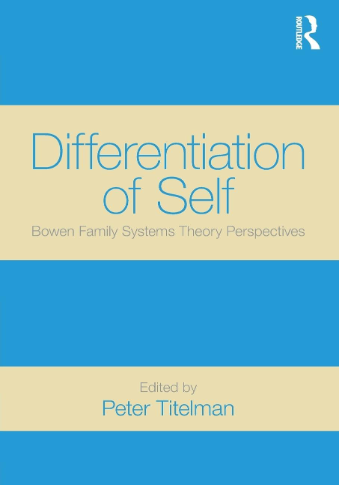Self differentiation may sound like a complex psychological concept, but in truth, it’s a powerful tool for personal growth and healthier relationships. Whether you’re navigating your way through narcissistic abuse recovery, identifying as an empath, or simply interested in elevating your self-awareness, understanding this concept is crucial. Therapists, too, are increasingly employing it to help their clients foster stronger emotional resilience.
We will explore what Self Differentiation means, how it manifests in our behavior, and how it can be applied in your own life to build confidence, improve relationships, and reduce anxiety. By the end of this post, you’ll have actionable steps to take control of your emotional life while staying true to yourself.
Mastering Emotional Independence: Insights from Bowen Family Systems Theory
What Is Self differentiation?
Self differentiation, a key concept derived from Dr. Murray Bowen’s Family Systems Theory, represents an individual’s ability to balance their emotional and intellectual self while staying true to their identity within social or family systems. It lies on a spectrum, influencing how effectively a person navigates relationships and life’s challenges.
Key Characteristics of Self Differentiation
Well-Differentiated Individuals
- Stay emotionally grounded, even under pressure or criticism.
- Maintain their sense of self while respecting the feelings and opinions of others.
- Approach conflicts with calmness, clarity, and logic.
Poorly Differentiated Individuals
- Are overly dependent on external opinions and approval.
- Overreact to stress and struggle to separate thoughts from emotions.
- Tend to feel overwhelmed by interpersonal tensions and chronic anxiety.
Understanding and enhancing self differentiation can lead to reduced anxiety, stronger relationships, and a more confident identity. A higher degree of self differentiation equips individuals to engage in meaningful connections while upholding their autonomy.
Improve your self differentiation by developing emotional regulation, setting healthy boundaries, and staying mindful during intense situations. With practice, you can foster inner strength and lead a more balanced, fulfilling life.
Understanding the Spectrum of Self Differentiation
Improving self differentiation is a process that involves understanding the spectrum of human behavior and identifying where you stand on it. Self differentiation is a concept deeply tied to how individuals balance their personal identity with emotional connections to others. It serves as the foundation for emotional stability, healthier relationships, and stronger boundaries. By honing this skill, you can significantly improve your mental well-being and ensure that your interactions with others are both meaningful and equitable. Below are insights into poorly differentiated individuals and well-differentiated individuals, as well as tips to enhance your self differentiation.
Characteristics of Poorly Differentiated Individuals
Individuals with low self differentiation often face challenges in maintaining a firm sense of self. Their identity heavily depends on external validation, leaving them vulnerable during high-stress situations or emotional conflicts. Here are some common traits of poorly differentiated individuals:
- Approval Dependence: They adjust their thoughts, actions, and decisions to gain acceptance and validation from others.
- People Pleasing: Their primary motive is to avoid disapproval, often sacrificing their own values and needs to appease others.
- Rigid and Controlling Behavior: They may pressure others to conform to their perspectives as a means to reduce feelings of rejection or insecurity.
- Anxiety-Prone Responses: Their overly enmeshed relationships and blurred boundaries can result in significant emotional distress.
These traits often create unstable relationships and an inner struggle with identity, anxiety, and dissatisfaction. However, with focused effort, individuals can progress towards higher self differentiation.
The Path to Self-Differentiation: Exploring Family Dynamics and Growth
Traits of Well-Differentiated Individuals
On the opposite end of the spectrum, well-differentiated individuals exhibit a strong sense of self and a healthy connection with the people around them. These individuals are equipped to maintain composure and autonomy, even in emotionally intense situations. Key characteristics include:
- Realistic Dependence on Relationships: They value emotional connections but do not rely on others to define their self-worth.
- Calmness Under Pressure: Challenging situations are met with emotional resilience and the ability to focus on facts rather than being overwhelmed by emotions.
- Healthy Boundaries: They maintain a balanced approach towards relationships, avoiding both emotional fusion and detachment.
- Adaptability: They respond to stress and change without compromising their personal values or identity.
By striving to develop these traits, you can improve your self differentiation and lead a more balanced life that accommodates both individuality and meaningful connections.
Assessing Your Position on the Spectrum
Take time to reflect on the traits outlined above and consider where you see yourself on the self differentiation spectrum. Are your actions and emotions overly influenced by others, or do you maintain a stable sense of self even during times of conflict? Awareness is the first step towards improvement. By actively working on building emotional strength, healthy boundaries, and independence, you can become a well-differentiated individual who thrives in both personal and professional relationships.
Improving self differentiation is not simply about achieving independence but finding harmony between the self and others. Through consistent practice and self-awareness, you can cultivate a secure identity and build relationships that uplift rather than diminish your sense of self.
Differentiation Within Families
Improving self differentiation is an ongoing process that plays a critical role in fostering healthier relationships, particularly within the family unit. Family relationships significantly influence self differentiation, as families operate as interconnected emotional systems, as explained by Bowen’s theory. According to this theory, the level of interdependence within a family can determine how its members respond to stress. When family members are less differentiated, emotional boundaries blur, and individuals often absorb each other’s anxieties. This can escalate minor tensions into chronic issues, creating ongoing strain within the family. For instance, parents who rely on their children to meet their emotional needs may unintentionally form “triangled” relationships, which further complicate family dynamics and hinder emotional growth.
On the other hand, families with higher levels of self differentiation are better equipped to handle challenging situations. Differentiated individuals maintain a sense of emotional independence while preserving their meaningful connections to others. This balance fosters adaptability, allowing families to manage stress and conflict without sinking into cycles of anxiety or dysfunction. By focusing on self differentiation, both individuals and families can create healthier, more stable relationships rooted in mutual respect and emotional resilience. Cultivating this skill not only benefits personal growth but also strengthens the foundation of family systems.
Practical Steps to Improve Your Differentiation
The good news? Self differentiation is a skill you can build over time. By focusing on intentional practices, individuals can strengthen their ability to balance emotional independence with meaningful connections. Here’s how you can start improving your self differentiation today:
- Practice Self-Reflection
Take time to analyze your emotional triggers and behavioral tendencies. Journaling can be a great way to track patterns and identify areas you want to improve. Self-awareness is a foundational component of self differentiation and helps you understand the underlying reasons behind your emotions and actions.
- Set Clear Boundaries
Learn to say “no” when needed and stand by your values, even if others disagree. Boundaries are essential to protecting your personal identity and reducing unnecessary stress caused by over-relying on the expectations of others. Healthy boundaries are a key element in developing strong self differentiation.
- Detach from the ‘Need to Please’
It’s important to recognize when your decisions are driven by the desire for approval rather than staying true to your values. Start by making smaller decisions without seeking validation from others. Over time, this practice will build confidence and strengthen your self differentiation.
- Stay Grounded During Conflict
When you find yourself in an argument or challenging situation, pause before reacting emotionally. Staying grounded allows you to focus on evaluating the situation objectively rather than letting heightened emotions dictate your response. This ability to self-regulate is crucial to building self differentiation.
- Seek Professional Guidance
Consider working with a therapist trained in family systems or cognitive-behavioral therapy. A professional can help you uncover unhealthy patterns, provide personalized strategies, and offer tools to improve your level of self differentiation over time.
Self differentiation is a gradual process, but by committing to these steps, you enhance personal growth, improve family dynamics, and foster more resilient relationships.
Differentiation of Self: Transform Your Relationships with Bowen’s Principles
Self differentiation and Empathy
Self differentiation is key to developing strong, healthy relationships and maintaining your sense of self, especially if you are naturally empathetic. If you’re an empath, you might find it even harder to maintain boundaries in emotionally charged environments. While empathy is an incredible gift, being overly enmeshed in others’ emotions can be draining and impact your sense of differentiation. Strengthening self differentiation doesn’t mean losing your ability to connect with others. Instead, it empowers you to protect your energy while still offering meaningful support.
To improve self differentiation, focus on cultivating self-awareness by reflecting on your values, emotions, and boundaries. Practice mindfulness to stay centered and grounded during interactions. Understanding the difference between your emotions and those of others is crucial, particularly in situations where emotional intensity can blur personal boundaries.
Working with a therapist who specializes in family systems or cognitive-behavioral therapy can be especially beneficial. They can help uncover patterns of enmeshment and provide tailored strategies for fostering self differentiation over time. Remember, improving your self differentiation is a gradual process, but it is one that enhances personal growth, fosters healthier dynamics, and ensures that your empathy becomes a strength rather than a source of emotional exhaustion.
Why Differentiation Benefits You
Improving self differentiation is crucial for those who want to thrive in their relationships and personal growth. Whether you’re an empath, recovering from narcissistic abuse, or simply striving to build stronger relationships, self differentiation is a powerful tool. It allows you to break free from destructive patterns, lower chronic anxiety, and foster healthier dynamics in both personal and professional settings.
Here’s why self differentiation matters and how to work on it:
- Build Emotional Resilience: Differentiation helps you respond to challenges without becoming overwhelmed, enabling you to remain calm and composed under stress.
- Strengthen Personal Boundaries: By distinguishing your emotions from those of others, you can avoid emotional enmeshment and protect your well-being.
- Enhance Relationships: Healthy dynamics stem from individuals who engage authentically without taking on others’ emotional burdens.
- Reduce Chronic Anxiety: Establishing clear boundaries lowers the tension caused by unclear expectations and over-involvement in others’ lives.
Working with a skilled therapist, particularly in family systems or cognitive-behavioral therapy, can provide invaluable support. They’ll help identify patterns of enmeshment, guide you through tailored strategies, and empower your ability to remain connected yet independent. While the process takes time, it promotes personal evolution, turning empathy into a strength and transforming your relational world.
Take Charge of Your Growth
Improving Self differentiation is a gradual yet highly rewarding process. If you’re eager to take the next step, my online program ‘Growth Mindset for Success’ is designed to empower you to build confidence, develop emotional clarity, and achieve personal fulfillment.
With expert-guided sessions, I’m here to help you transform your mindset and master the art of self-differentiation. Sign up today and start leading the life you truly deserve!






